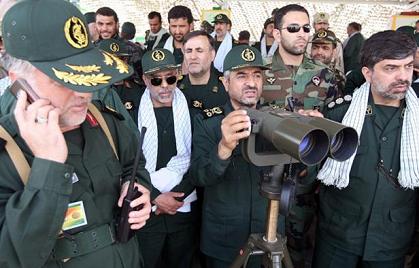by WorldTribune Staff, May 26, 2017
Iran is looking to establish a permanent military presence in Syria and is eyeing a potential base near the Syrian border with Israel or Jordan, two U.S. lawmakers said.
“A permanent Iranian military base in Syria … would increase Iran’s operational capacity to inflict serious damage against two of our closest allies in the region,” Rep. Peter Roskam, Illinois Republican, and Rep. Ted Deutch, Florida Democrat, wrote in a letter to Secretary of State Rex Tillerson.

The lawmakers’ warning comes as a Senate panel on May 25 approved new U.S. sanctions targeting Iran’s support for international terrorism and its ballistic missile program, the first move to punish Teheran since the Joint Comprehensive Plan of Action (JCPOA) nuclear accord went into effect.
With Russia is propping up Assad in partnership with Iran, the defeat of ISIS could lead to a new phase of regional rivalry, lawmakers said.
“The day after Raqqa falls is going to be the moment that Iran moves to try to oust the United States from the region,” Sen. Marco Rubio, Florida Republican, told the Washington Examiner in February.
Roskam and Deutch have a similar concern. “Iran is actively working to establish a permanent military presence in Syria,” they wrote Tillerson. “The Islamic Republic seeks to solidify its access to the Mediterranean Sea by building a permanent seaport and constructing numerous military installations throughout the country. A permanent Iranian military presence in Syria would greatly harm U.S. interests in the region and decrease the likelihood of reaching a political agreement to end the Syrian civil war.”
The lawmakers want Tillerson to try to weaken Iran by cracking down on the regime’s commercial aviation industry, which is often used to smuggle weapons to Assad. “It is imperative to develop and implement policies to prevent a permanent Iranian military presence in Syria,” Roskam and Deutch wrote.
The May 25 vote by the Senate Foreign Relations Committee on new Iran sanctions came days after President Donald Trump pledged common cause with Israel and Sunni Arab states to counter Iranian influence in the region.
“If you think about what just happened with the [president’s] trip to Saudi Arabia, this begins to coordinate a Middle Eastern strategy that counters Iran’s aggression in the region. There is a move to push back against the many nefarious activities that Iran has been engaged in,” said Sen. Bob Corker, Tennessee Republican.
Eight of the committee’s 10 Democrats supported the sanctions bill, including Chris Coons of Delaware, who, in 2015, supported the Iran nuclear deal.
“This bill shows a continuing determination by the American Congress to stand up to Iran’s continued, even expanded malign activities around the world: their ongoing ballistic missile launches, their support for terrorism, their human rights violations,” Coons said. “All of these are areas that are specifically called out in the JCPOA as areas where it is appropriate and possible for the United States, if necessary, to impose additional sanctions.”
Ahead of the vote, a central figure in nuclear negotiations with Iran, former Secretary of State John Kerry, took to Twitter to warn against new sanctions, writing: “There are many tools to up the pressure already in place and at our disposal. We need to weigh/consider risk to JCPOA.”
Such concerns are unwarranted, according to backers of the sanctions.
“We know that this in no way touches the nuclear deal,” Corker said.
“Teheran can argue all they want that these areas for additional sanctions are not permitted under the JCPOA,” Coons said. “The plain text of the agreement allows additional sanctions in these three areas [support for terrorism, missile development, and human rights].”
Letters to the Editor __ Subscribe to Geostrategy-Direct __ Support Free Press Foundation
